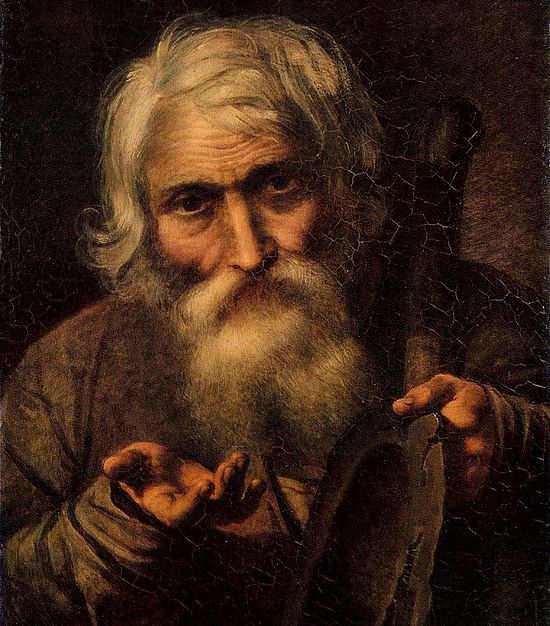 “An Old Beggar” by Vasily Shebuyev.
“An Old Beggar” by Vasily Shebuyev.
We Orthodox consider ourselves to be the followers and successors of the first Christians. We are members of the Church founded by the Apostles and their disciples and we confess the very teaching that they confessed.
But there is something that makes us as different from Church people of the apostolic age as chalk from cheese.
In the first centuries of Christianity, entering the Church meant a fundamental change in someone’s life. Rare exceptions apart, no one was accepted into a Christian community immediately. A catechumen was expected to witness the faith by his spiritual and moral transformation and prove his faithfulness to Christ even before his Baptism.
The sacrament of Baptism bestowed a “seal” of the grace of the Holy Spirit on the transformation of the heart that ideally had already happened to a believer!
We will make a disclaimer and say that we shouldn’t idealize the first Christian communities. They did have their temptations, sins and falls. It is enough to read the First Epistle of the Apostle Paul to the Corinthians to understand this. But the reality was that first a believer became a highly moral person and then entered the Church.
This is something we don’t have in our days.
We try to implement a different idea which is noble as such: to make someone a good Christian from childhood (to have him baptized, take him to Communion, instruct him in faith, and so on). But this idea works very badly due to a wide range of factors—for example, weak integration of parents and godparents into Church life, lack of catechization in parishes, the indifference of clergy to these matters… As a result we have what we have: there are far more Christians than good and kind people! It’s a paradox!
***
This is a terrifying theme. It “beats us out and out”, as if addressing our hearts: “Listen, you are doing something wrong! You are walking in the wrong direction!”
We recall the Parable of the Last Judgment. The Savior reveals the criteria to us by which He will judge the world. And much to our surprise, in Christ’s speech we don’t find any words about prayer, fasting, bows, or how often we should take Communion… Instead, we hear:
I was an hungered, and ye gave Me meat: I was thirsty, and ye gave Me drink: I was a stranger, and ye took Me in: Naked, and ye clothed Me: I was sick, and ye visited Me: I was in prison, and ye came unto Me (Mt. 25:35-36).
In effect, the only thing the Lord will ask us at the Last Judgment about is our love for God and our neighbors.
True, a Christian is molded by fasts, prayers, abstinence, bows, and other ascetic exercises, along with the participation in Church sacraments. But all of these are instruments to attain our aim. And our only aim is love.
The instruments are your personal business. You decide for yourself how much to pray, how often to take Communion, whether to read the Gospel, make bows, and go to church. The required result remains the same: your love and its embodiment in your highly moral Christian life. If there is no result, you are doing something wrong. Perhaps you are using the instruments improperly.
The road towards love is long and difficult, that is why charity… is the bond of perfectness (Col. 3:14). There are very important milestones on this road. For example, simple goodness and the usual qualities of a good person. Before becoming like God you need to become a real human being.
Today we have many Christians but few truly kind people. How is it possible?
***
Thinking about this, we cannot help but recall more verses from the Bible.
In his Epistle to the Romans the Apostle Paul wrote that while many Jews (descendants of Abraham) among his contemporaries had the mark of circumcision on their bodies, they were not Jews in spirit. Likewise, the uncircumcised pagans who had never heard of Abraham but lived according to the law of conscience appeared to be closer to God than representatives of the chosen people.
Here is this paragraph:
For he is not a Jew, which is one outwardly; neither is that circumcision, which is outward in the flesh: but he is a Jew, which is one inwardly; and circumcision is that of the heart, in the spirit, and not in the letter; whose praise is not of men, but of God (Rom. 2:28-29).
But what if we put the word “Orthodox” instead of “Jew” and replace “circumcision” with “Baptism”, translating the situation to our days? After all, the spiritual laws expressed in the Word of God remain unchanged even thousands years later.
“For he is not Orthodox, which is one outwardly; neither is that Baptism, which is outward in the flesh: but he is Orthodox, which is one inwardly; and Baptism is that of the heart, in the spirit, and not in the letter; whose praise is not of men, but of God.”
Isn’t it interesting? Indeed you can observe all the Orthodox rules without actually being Orthodox! To be Orthodox means not only to be baptized. Orthodoxy is not only a particular worldview; it’s also a particular way of life: “in the spirit, and not in the letter.”
If there is no such way of life, it appears that Church life for someone has been to no purpose—and it’s a pity. And communicating with fairly many Church people you often think the same—“it’s a pity.”
And it is even more regrettable when non-believers, representatives of other religions and heterodox are purer and more righteous than we Orthodox!
Sometimes we see that at a factory a non-believer is a more conscientious worker and has a better reputation than a church-goer. Or a Muslim can be a more faithful and sensitive friend than we Orthodox. And it can be really disappointing to see that in a Baptist family children obey their parents perfectly, the whole family prays and reads the Bible daily, strives to fulfil God’s commandments most carefully, whereas our Orthodox brother, though he wears a cross and goes to church on the great festivals, lives like a pagan and has never taken the Gospel into his hands.
Then the following words of the Apostle Paul (not literally, but in principle) are fulfilled in us:
The name of God is blasphemed among the Gentiles through you, as it is written (Rom. 2:24).
True, Christianity is not limited to “being good.” We are saved by our faith in the Lord Jesus Christ and not by our righteousness. But where faith has not helped you at least become “good” there is no Christianity.
***
It is written in the Book of Acts that the first Christians lived having favour with all the people* (Acts 2:47) and that of the rest durst no man join himself to them: but the people magnified them (Acts 5:13). But today we are not loved much, to say nothing of being “magnified” by the people. And we can also say with certainty that no one has the “fear” of joining Orthodox (in the sense the “awe” of the greatness of our Christian life).
In connection with this now we desperately need a new Church revival—a moral one. The time of “revival” in the sense of the restoration and reconstruction of churches and monasteries is over. And in the sense of “spiritual education” it will soon be over too: there are plenty of courses and information on the internet which allow you to become religiously literate and knowledgeable. Now it’s time for us to become Christians by our way of life! Without this all the other spheres of this revival will make no sense. By “way of life” I mean not only keeping Church discipline but above all the system of our relations with our neighbors.
Let people pay attention to a believer who has started attending church not because he “has become strange” and begun “to live an abstract, individual life in Christ” (sometimes at the cost of ruining relations with others), but because with time he has turned into a loving son, an excellent husband, a good father, a sensitive friend, and a reliable employee thanks to Christ!
I am sorry if this sounds like a platitude, but let us become just good people as a start! Benevolent and friendly, kind and reliable!
Let women find good men in the Church—industrious and without bad habits. Let men find good women in the Church—who will respect their husbands and keep the house well. Let all of us meet sensitive and true friends in the Church; let all of us find not only spiritual help, but also material and emotional support there.
Otherwise we can’t be called Christians! For the outward indicator of our inward Christianity is our morality and not the number of times we’ve attended church or the frequency of our participation in the sacraments of confession and Communion.
***
The Lord took great pity on loose women and thieves but said extremely harsh things towards religious hypocrites—the scribes and the Pharisees. Spiritual leaders by their outward religiosity, they were inferior to pagans in many respects in their human qualities. And if today Church Christians are inferior to non-believers in basic moral categories, this denunciation by the Lord concerns them as well:
Woe unto you… hypocrites (Mt. 23:13).
The fact that believers are sometimes indistinguishable from non-believers and in some cases are even worse than them is probably one of the main tragedies of contemporary Christianity. Non-believers don’t recognize Christians in us—and that is terrible. Because Christianity without purity of life is like meat without meat or milk without milk.
From the inward to the outward. From Paradise inside to the transformation of the world outside. To keep Paradise inside and cultivate it outside is the purpose of human life according to the command of God (cf. Gen. 2:15). And this transformation of the world begins with a mere smile, mere goodness, and “a good person.”
Howbeit that was not first which is spiritual, but that which is natural; and afterward that which is spiritual (1 Cor. 15:46).
This is something we are so lacking now.




